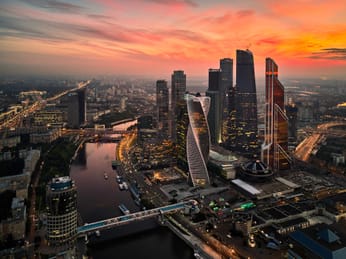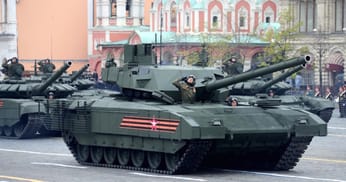
Rapper in hot water
Hello! Our top story this week is about how comments by rapper Morgenshtern on the senselessness of Victory Day sparked an official backlash and forced the popular musician to apologize. We also look at how a criminal case against an ex-deputy education minister is linked to a conflict with a billionaire friend of Putin, a mysteriously well-funded political ad campaign, and a quasi-lockdown in Moscow.

Les autorités attaquent la star du rap Morgenshtern pour avoir critiqué le Jour de la Victoire
Popular rapper Alisher Morgenshtern landed in hot water this week when he criticized Russia’s lavish annual celebrations to mark the Soviet Union victory over Nazi Germany in 1945. His words brought an angry response from both the Kremlin and the head of the powerful Investigative Committee, Alexander Bastrykin.
- In a video interview with TV presenter Ksenia Sobchak released Monday, Morgenshtern said he didn’t understand why Russia spent millions of rubles on military parades and other Victory Day events. “Perhaps there isn’t anything to be proud of,” he said. “Remembering that once upon a time we won something, and doing this every year for almost a century … I don’t understand.” Morgenshtern said it was time to celebrate more recent triumphs, like achievements in IT or space.
- La victoire de la Seconde Guerre mondiale est un pilier idéologique essentiel, et la réaction n'a pas tardé. Le lendemain, l'attaché de presse du président Vladimir Poutine, Dmitri Peskov, a déclaré que le musicien ignorait l'histoire. "Allez demander à n'importe lequel de nos anciens combattants, qui sont de moins en moins nombreux, mais qui vivent encore parmi nous. Demandez-leur pourquoi le jour de la Victoire est si important", a-t-il déclaré.
- Morgenshtern s'est excusé pour ses remarques. "Je n'ai en aucun cas cherché à diminuer l'importance de l'événement, j'ai juste admis honnêtement que je ne comprends pas et que cette phrase a été prise hors contexte", a-t-il écrit mardi sur Instagram. Le rappeur a ajouté qu'il était fier des anciens combattants mais qu'il n'avait "pas réussi à exprimer correctement ses idées", et a souligné que son appel à plus de fonds pour les anciens combattants "n'a même pas fait partie de l'interview".
- Mais il est trop tard. Bastrykin a ordonné une enquête sur les propos de Morgenshtern. Un communiqué de presse du comité d'enquête affirme que le rappeur populaire a insulté "la mémoire historique des défenseurs de la patrie". En vertu d'une nouvelle loi adoptée au début de l'année, il s'agit d'une infraction pénale passible d'une peine d'emprisonnement de cinq ans. Le leader de l'opposition Alexei Navalny a été condamné à une amende en vertu d'une version précédente de la même loi pour avoir prétendument calomnié un ancien combattant.
- Le présentateur Sobchak a souligné que Morgenshtern avait seulement dit qu'il ne comprenait pas l'ampleur des célébrations. "Il a 23 ans ! Il représente une génération différente, qui ne peut pas, sur le plan émotionnel, réagir à ce qui s'est passé il y a 76 ans", a-t-elle écrit.
- Le musée de la Victoire de Moscou a invité Morgenshtern à une visite guidée à la suite de ses commentaires. Son avocat a déclaré que le musicien serait heureux de visiter le musée. "Je pense qu'il s'agit d'une initiative judicieuse, car les jeunes ne devraient pas être punis pour des choses qu'ils ne connaissent pas ou ne comprennent pas, mais devraient au contraire être éclairés", a ajouté l'avocat.
- Dans un sondage réalisé au début de l'année, M. Morgenshtern a été considéré comme l'"influenceur" le plus influent auprès des jeunes Russes. Mais ce n'est pas son seul démêlé avec la justice. Début juin, il a été condamné à une amende de 100 000 roubles (1 400 dollars) pour avoir fait l'apologie de la drogue dans ses textes. Le musicien a insisté sur le fait qu'il était "absolument innocent" et a fait appel de l'amende en vain.
- Pour M. Bastrykin, l'enquête sur M. Morgenshtern est la dernière tentative en date pour redorer son image de défenseur des valeurs conservatrices. Le même jour, M. Bastrykin a ordonné une enquête sur l'artiste Kirill Miller de Saint-Pétersbourg, alléguant qu'il avait offensé des vétérans de guerre à cause d'une de ses peintures représentant un groupe de personnes tenant des pancartes avec des têtes humaines déformées.
- Cependant, les tentatives de Bastrykin pour se hisser au sommet de l'actualité ne sont pas toujours couronnées de succès. Au début de la semaine, il a déclaré qu'il "prenait le contrôle" de la disparition signalée de l'actrice Svetlana Svetlichnaya. Cependant, l'actrice a été rapidement retrouvée et il s'est avéré que l'incident n'était qu'une opération de relations publiques. L'attention portée à Svetlichnaya a eu pour effet de détourner les ressources des efforts déployés pour retrouver les personnes réellement disparues. L'organisation de recherche et de sauvetage Liza Alert a déclaré que c'était l'une des raisons pour lesquelles elle n'avait pas réussi à retrouver un homme dans les bois de la région de Moscou, qui a fini par mourir.
Pourquoi le monde doit-il s'en préoccuper ?
Morgenshtern’s experience is a warning to the younger generation about the dangers of being apolitical, according to blogger Ilya Varlamov. A year ago, the musician gave an interview in which he said that he has no interest in politics. “We have a wonderful country in which to build a business,” he said at the time. However, within a year, he has been forced to apologize after pressure from officials — in order to save that same business.
Influential lawmaker linked to conflict behind ‘Rakova case’
The so-called ‘Rakova case’ is fast becoming one of the most significant criminal cases to be opened this year. So far, it has implicated former deputy minister Marina Rakova and the head of one of the country’s last surviving independent universities. Since we last reported on the case, The Bell has established that the criminal investigation was preceded by a conflict over multi-billion ruble state contracts involving Russia’s largest high school textbook publisher, Prosveshcheniye, which is controlled by veteran lawmaker Oleg Tkach.
- Sources who spoke to The Bell described Rakova as a “harsh” and “uncompromising” bureaucrat, but acknowledged she did a great deal for education. “Without Rakova there would be no Quantorium,” one admitted. Quantorium was Rakova’s signature achievement in government: 135 study centers in 84 of Russia’s 85 regions. Each one is different, but they generally have expensive facilities to provide free teaching of subjects like coding, robotics, microbiology, and 3D-modeling. They are funded by a mix of government and corporate money.
- There are no official figures, but the cost of each Quantorium center was estimated to be about 104.5 million rubles ($1.5 million). So, contracts for all the study centers built since 2015 would be worth a minimum of 14.1 billion rubles.
- Officially, the Rakova case is not linked to Quantorium. Instead, Rakova is accused of fraud over research her ministry commissioned from the Moscow Higher School of Social and Economic Science (Shaninka). Rakova is currently in prison, as is her partner Artur Stetsenko, two former government colleagues, Yevgeny Zak and Maksim Inkin, and Kristina Kryuchkova, former executive director of Shaninka. Sergei Zuev, rector of Shaninka, is under house arrest.
- Nevertheless, it was Quantorium that led to Rakova acquiring influential enemies and may provide the key to understanding why she is now behind bars, five different sources told The Bell. One of Rakova’s biggest conflicts was with the Prosveshcheniye publishing house, which enjoys a virtual monopoly on the production of textbooks for Russian high schools.
- However, as well as textbooks, Prosveshcheniye is involved in equipping educational buildings. And, according to three people close to the project, it had plans for Quantorium — Prosveshcheniye wanted to supply equipment to the study centers.
- Rakova often spoke out internally against Prosveshcheniye’s lobbying, an Education Ministry source told The Bell. A former colleague of Rakova’s said the publishing house pushed for changes to procurement procedure. “Rakova successfully resisted this pressure,” said one official. “She was able to uphold high standards, ensuring schools did not receive laptops that had to be scrapped within a year.”
- When Rakova left government earlier this year for a senior position at state-owned Sberbank, the conflict did not end. In May 2021, Sberbank, development bank VEB.RF and state-owned Russian Direct Investment Fund reached a deal to buy 25 percent of Prosveshcheniye. Rakova was in charge of Sberbank’s involvement and joined the publisher’s board of directors on behalf of the bank. The bad blood continued to be an issue in her new role, several of her acquaintances said.
- Prosveshcheniye was set-up in the Soviet Union to produce high school textbooks (effectively holding a monopoly on this business). However, in the 20 years following the collapse of Communism, its market share dropped to 35 percent. It was bought in 2011 by Olma Media, a small publishing house owned by senator Oleg Tkach and his business partner, Vladimir Uzun. For the purposes of the deal, Prosveshcheniye was valued at about 2.25 billion rubles and Tkach and Uzun got the money from SMP Bank, which is owned by billionaire brothers Arkady and Boris Rotenberg — who are also close friends of Putin. Prosveshcheniye backed out of a planned IPO in 2017 because of the risk posed by U.S. sanctions.
- Now, Prosveshcheniye once again has an effective monopoly on the production of high school textbooks. In effect, the state guarantees the publisher rising profits.
- Tkach is known as one of the most influential members of Russia’s upper house of parliament. In a rating of influence compiled by NGO Transparency International, he ranks higher than Federation Council speaker Valentina Matvienko and deputy speaker Nikolai Zhuravlyov. Of 17 laws he has proposed, 14 were passed.
Pourquoi le monde doit-il s'en préoccuper ?
For some time now, the Russian government has been investing large sums of money in high school education, and textbooks are seen to be of particular importance in shaping the outlook of young people. Rakova evidently made some powerful enemies.
IN BRIEF
Moscow enters quasi-lockdown amid rising COVID-19 cases
Moscow went into a partial lockdown Wednesday in an attempt to contain rising coronavirus cases. The measures have been dubbed a ‘business lockdown’ since the movements of individuals are not restricted. For now, it’s due to last for a week. People are barred from shops and services, sport, leisure and cultural events, public entertainments, cinema screenings and more. Only online sales and takeaway food services will be allowed. There is already much debate about whether this quasi-lockdown will be extended any further: although Moscow City Hall denied a prolongation was on the cards, Forbes magazine cited eight separate sources in a report suggesting this was under discussion. Other Russian regions have also imposed restrictions — the number of confirmed COVID-19 cases in a single day topped 40,000 for the first time Thursday. According to official figures, 49.2 million people are fully vaccinated, which is about one third of the Russian population.









